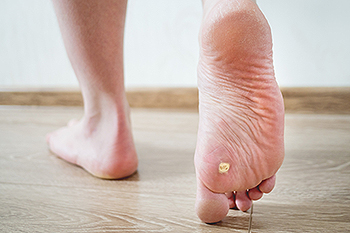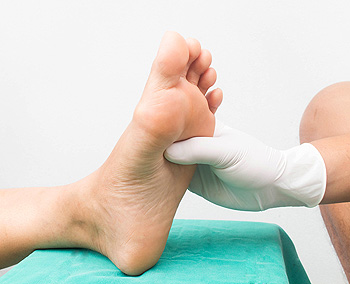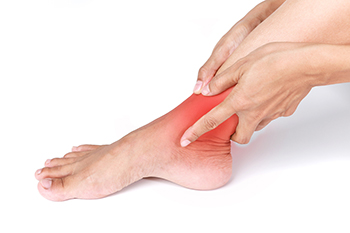Connect With Us
Blog
Items filtered by date: June 2022
Dealing With Plantar Warts

If you notice a flat hardened callus on the bottom of your foot with tiny black spots showing beneath the skin, you may have a plantar wart. The area might be tender, but try not to touch it. This growth may be caused by the human papillomavirus (HPV), which is highly contagious and can enter your body through cuts or sores. The most common places to come into contact with HPV are swimming pools, locker rooms, and bathroom floors, all areas in which you are more likely to walk barefooted. Generally speaking, plantar warts are not dangerous, but they do spread rapidly. The most effective preventative method is to wear foot coverings in places where the virus thrives. If plantar warts become a common occurrence, refuse to go away on their own, or inhibit your ability to walk, it is a good idea to visit a podiatrist for guidance and a range of treatment options.
Plantar warts can be very uncomfortable. If you need your feet checked, contact Vivian C. Iwu, DPM from Choice Podiatry Center. Our doctor will assist you with all of your foot and ankle needs.
About Plantar Warts
Plantar warts are the result of HPV, or human papillomavirus, getting into open wounds on the feet. They are mostly found on the heels or balls of the feet.
While plantar warts are generally harmless, those experiencing excessive pain or those suffering from diabetes or a compromised immune system require immediate medical care. Plantar warts are easily diagnosed, usually through scraping off a bit of rough skin or by getting a biopsy.
Symptoms
- Lesions on the bottom of your feet, usually rough and grainy
- Hard or thick callused spots
- Wart seeds, which are small clotted blood vessels that look like little black spots
- Pain, discomfort, or tenderness of your feet when walking or standing
Treatment
- Freezing
- Electric tool removal
- Laser Treatment
- Topical Creams (prescription only)
- Over-the-counter medications
To help prevent developing plantar warts, avoid walking barefoot over abrasive surfaces that can cause cuts or wounds for HPV to get into. Avoiding direct contact with other warts, as well as not picking or rubbing existing warts, can help prevent the further spread of plantar warts. However, if you think you have developed plantar warts, speak to your podiatrist. He or she can diagnose the warts on your feet and recommend the appropriate treatment options.
If you have any questions please feel free to contact our office located in Marietta, GA . We offer the newest diagnostic and treatment technologies for all your foot and ankle needs.
Wounds That Don't Heal Need to Be Checked
Achilles Tendinopathy: A Common Sports Injury

The Achilles tendon attaches the heel bone with the calf muscles and helps make plantar flexion possible (bending your foot downward at the ankle). Tennis players, dancers, and runners in particular engage their Achilles tendon constantly, and can sometimes suffer an overuse injury known as Achilles tendinopathy. Achilles tendinopathy usually develops when tiny repeated injuries (micro-traumas) to the Achilles tendon occur and never fully or properly heal. This repeated wear and damage compounds over time and eventually causes the Achilles tendon to become swollen, stiff, and painful. Poor training habits can also be a precursor to Achilles tendinopathy, such as training on hard/sloped surfaces, using improper technique, wearing inadequate footwear, and increasing the intensity or frequency of your workouts too rapidly. If you believe you have Achilles tendinopathy, it is suggested that you consult with a podiatrist as soon as possible. A podiatrist can relieve your symptoms while helping to heal the Achilles tendon properly with various techniques and therapies, exercises, painkillers, orthotics, and more.
Sports related foot and ankle injuries require proper treatment before players can go back to their regular routines. For more information, contact Vivian C. Iwu, DPM of Choice Podiatry Center. Our doctor can provide the care you need to keep you pain-free and on your feet.
Sports Related Foot and Ankle Injuries
Foot and ankle injuries are a common occurrence when it comes to athletes of any sport. While many athletes dismiss the initial aches and pains, the truth is that ignoring potential foot and ankle injuries can lead to serious problems. As athletes continue to place pressure and strain the area further, a mild injury can turn into something as serious as a rupture and may lead to a permanent disability. There are many factors that contribute to sports related foot and ankle injuries, which include failure to warm up properly, not providing support or wearing bad footwear. Common injuries and conditions athletes face, including:
- Plantar Fasciitis
- Plantar Fasciosis
- Achilles Tendinitis
- Achilles Tendon Rupture
- Ankle Sprains
Sports related injuries are commonly treated using the RICE method. This includes rest, applying ice to the injured area, compression and elevating the ankle. More serious sprains and injuries may require surgery, which could include arthroscopic and reconstructive surgery. Rehabilitation and therapy may also be required in order to get any recovering athlete to become fully functional again. Any unusual aches and pains an athlete sustains must be evaluated by a licensed, reputable medical professional.
If you have any questions please feel free to contact our office located in Marietta, GA . We offer the newest diagnostic and treatment technologies for all your foot and ankle needs.
What is Diabetic Neuropathy?

Many people who have had diabetes for a long time may also have a condition known as diabetic neuropathy. The most common form is peripheral neuropathy, which in diabetics usually affects the feet. Symptoms include numbness, reduced ability to feel pain or temperature changes, and tingling or burning sensations. Sharp pains or cramps may also occur. These can further evolve into foot ulcers (wounds that do not heal properly) and infections from cracks or sores in the skin. If ignored or left untreated, gangrene may develop which could lead to surgery or amputation. The main causes of peripheral neuropathy are high levels of sugar and triglycerides in the blood which can damage the nerves and blood vessels in the feet. Since the symptoms of peripheral neuropathy develop over time, it is easy to overlook this condition. Daily foot care is imperative to maintain healthy feet. Another important way to prevent or handle diabetic neuropathy is to schedule regular visits to a podiatrist who can monitor the condition of your feet and treat them accordingly.
Neuropathy
Neuropathy can be a potentially serious condition, especially if it is left undiagnosed. If you have any concerns that you may be experiencing nerve loss in your feet, consult with Vivian C. Iwu, DPM from Choice Podiatry Center. Our doctor will assess your condition and provide you with quality foot and ankle treatment for neuropathy.
What Is Neuropathy?
Neuropathy is a condition that leads to damage to the nerves in the body. Peripheral neuropathy, or neuropathy that affects your peripheral nervous system, usually occurs in the feet. Neuropathy can be triggered by a number of different causes. Such causes include diabetes, infections, cancers, disorders, and toxic substances.
Symptoms of Neuropathy Include:
- Numbness
- Sensation loss
- Prickling and tingling sensations
- Throbbing, freezing, burning pains
- Muscle weakness
Those with diabetes are at serious risk due to being unable to feel an ulcer on their feet. Diabetics usually also suffer from poor blood circulation. This can lead to the wound not healing, infections occurring, and the limb may have to be amputated.
Treatment
To treat neuropathy in the foot, podiatrists will first diagnose the cause of the neuropathy. Figuring out the underlying cause of the neuropathy will allow the podiatrist to prescribe the best treatment, whether it be caused by diabetes, toxic substance exposure, infection, etc. If the nerve has not died, then it’s possible that sensation may be able to return to the foot.
Pain medication may be issued for pain. Electrical nerve stimulation can be used to stimulate nerves. If the neuropathy is caused from pressure on the nerves, then surgery may be necessary.
If you have any questions, please feel free to contact our office located in Marietta, GA . We offer the newest diagnostic and treatment technologies for all your foot care needs.
An Often Overlooked Ankle Injury

A type of injury that affects the lower inside of the leg, ankle, and arch is known as posterior tibialis tendonitis. Because injury to this tendon can easily be overlooked, it may cause ongoing problems with stability and arch support. Further, it can cause flat feet. Symptoms include painful inflammation to the inside of the ankle, difficulty bearing weight, tightness when flexing the foot, and tenderness in the arch. The most common causes of posterior tibialis tendonitis are a change in gait to compensate for pain from another injury or swelling in the ankle joint. One way to detect posterior tibialis tendonitis is to stand on tiptoe on the affected leg. Pain in this position may indicate injury. If so, it is a good idea to consult a podiatrist for a thorough exam and treatment options.
Ankle pain can be caused by a number of problems and may be potentially serious. If you have ankle pain, consult with Vivian C. Iwu, DPM from Choice Podiatry Center. Our doctor will assess your condition and provide you with quality foot and ankle treatment.
Ankle pain is any condition that causes pain in the ankle. Due to the fact that the ankle consists of tendons, muscles, bones, and ligaments, ankle pain can come from a number of different conditions.
Causes
The most common causes of ankle pain include:
- Types of arthritis (rheumatoid, osteoarthritis, and gout)
- Ankle sprains
- Broken ankles
- Achilles tendinitis
- Achilles tendon rupture
- Stress fractures
- Bursitis
- Tarsal tunnel syndrome
- Plantar fasciitis
Symptoms
Symptoms of ankle injury vary based upon the condition. Pain may include general pain and discomfort, swelling, aching, redness, bruising, burning or stabbing sensations, and/or loss of sensation.
Diagnosis
Due to the wide variety of potential causes of ankle pain, podiatrists will utilize a number of different methods to properly diagnose ankle pain. This can include asking for personal and family medical histories and of any recent injuries. Further diagnosis may include sensation tests, a physical examination, and potentially x-rays or other imaging tests.
Treatment
Just as the range of causes varies widely, so do treatments. Some more common treatments are rest, ice packs, keeping pressure off the foot, orthotics and braces, medication for inflammation and pain, and surgery.
If you have any questions, please feel free to contact our office located in Marietta, GA . We offer the newest diagnostic and treatment technologies for all your foot care needs.


